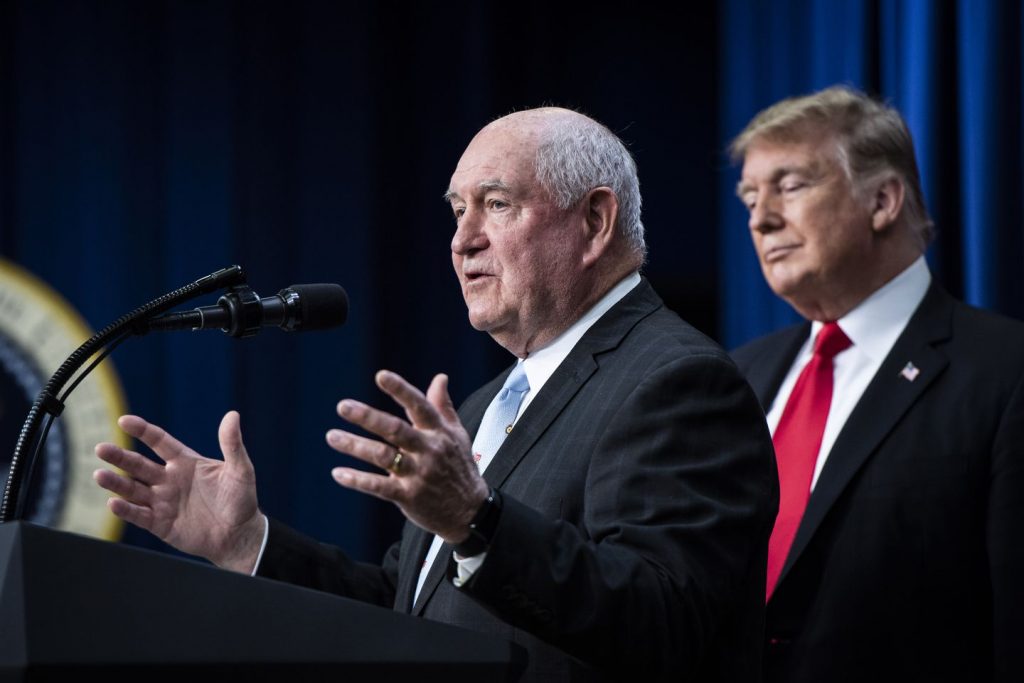
But some came away angry after Perdue — speaking in a state that lost nearly two dairy farms a day last year — remarked that small farms would probably not survive as the “big get bigger and small go out.”
The remark reverberated across the country, prompting calls for his resignation from farm groups, angry editorials and even criticism from his own party. Critics said Perdue’s “go big or get out” line played into existing fears that the Trump administration is more interested in helping large corporations than the little guys. Perdue later said he was only acknowledging the current market reality.
Over the last year, Perdue has emerged as President Trump’s key evangelist in bruising trade wars, traveling the country to give folksy pep talks to frustrated farmers who have seen their incomes drop and exports hit hard by tariff disputes.
As talks between China and the United States on a possible first phase of a trade deal continue, Perdue could have some welcome news for this key constituency that helped elect Trump — a third round of bailout payments on top of the more than $26 billion already being spent.
Two economists at the Agriculture Department, who spoke on the condition of anonymity because they were not authorized to speak publicly, said a third round of payments for farmers increasingly is seen as inevitable, particularly if a trade deal with China is not reached soon. The amount has not been determined.
Perdue said Thursday he was “hopeful” that the pending trade deal would “supplant any type of farm aid needed in 2020.” But a third round of aid could be crucial to shoring up Trump’s support in rural America as the election looms, analysts say.
In more than two years in office, Perdue, a former Georgia governor, has perfected the art of flattering the president — a must for any high-ranking Trump official. He spent more time in a recent podcast with Trump’s former press secretary Sarah Sanders lauding Trump than discussing farmer woes. Trump has said that what he doesn’t know about farming, “Sonny teaches me.”
Mick Mulvaney, Trump’s acting chief of staff, said the White House thinks its support within the farming community is “overwhelmingly solid” in large part because of Perdue’s efforts.
“The president really likes people who know their stuff. And it’s been very clear from very early on that Sonny knows this industry, that Sonny knows the people, Sonny knows the issues, he knows how to communicate the issues,” Mulvaney said in an interview. “So there’s a certain level of expertise that immediately sort of, you know, moved him to the head of the class.”
As the head of the USDA, Perdue has been a disrupter in the Trump mold. He has worked to transform the sprawling $140 billion agency of nearly 100,000 employees by cutting staff, jettisoning research and rolling back directives on forest preservation and food safety.
Perdue has run afoul of Democrats in Congress, child poverty advocates and science groups, who worry about his skepticism of climate change — “I think it’s weather patterns, frankly,” he said recently — and moves they say have weakened the agency’s research wings.
Internally he’s been praised for his relentless promotion of the administration’s agenda. In recent days he’s been out touting China’s alleged commitment to more than double its agriculture purchases from the United States — a trade agreement celebrated by Trump but not yet committed to paper, much less signed.
But patience with Perdue’s sunny bromides is waning in rural America, where farm bankruptcies and loan delinquencies are rising. Before the “big get bigger” misstep, Perdue was booed in August in Minnesota over an ill-timed joke that suggested farmers were whiners.
“He’s supposed to be the head of the Agriculture Department, a true representative of farmers, but it felt like he was pretty out of touch with what was going on here in farm country,” said Darvin Bentlage, 63, a cattle producer in Golden City, Mo. A third trade bailout would help, he said, “but it won’t make us whole and we don’t want to be making our money at the mailbox. We’d rather be making it at the marketplace.”
Farmers worried
When he arrived at an early morning breakfast recently with produce growers just blocks from the White House, Perdue, 72, was all smiles, backslapping greetings and posing for photos. “Y’all know President Trump is trying to stand up [against] some of the practices that China has been engaged in for a number of years,” Perdue told them.
China and the United States have imposed tariffs on billions of dollars worth of goods since Trump imposed the first round of tariffs on China for allegedly unfair trade practices in July 2018, profoundly impacting the global economy.
Some of the farmers who had gathered to see Perdue said they were worried and they can’t hold out forever. Agriculture exports to China fell from nearly $20 billion in 2017 to $9 billion last year, according to the American Farm Bureau Federation, with farm bankruptcies rising 24 percent.
The USDA said in an August report that net farm income is forecast to increase slightly this year, but it’s still down more than 35 percent of its high of $136 billion in 2013.
Bob Mast, president of CMI Orchards, which grows apples, pears and cherries in Washington state, said that because of the trade war, he’s been able to ship only a quarter of the cherries he normally would to China.
“China typically takes the largest amount we grow, and they’re willing to pay premium for it,” Mast said. “We have gotten some relief money from government. That’s helped, but we need a resolution to it by cherry season next year.”
Experts say that many large farm operations — whom critics say benefited more from the first round of trade aid than mom-and-pop operations — may be able to hold out longer by tapping into their equity. Others won’t be as fortunate.
As Perdue himself often says, “You can’t pay the bills with patriotism.”
Still, most farmers remain in Trump’s camp. Trump’s job approval rating among rural Americans remains higher than the country as a whole — by 54 to 38 percent — according to a Washington Post-ABC News poll in September.
During his first speech to the USDA staff in April 2017, Perdue made a point of stripping off his suit jacket, tossing away his tie and rolling up his sleeves.
“Y’all need to know I was a farmer first,” he said to applause. “We’re going to get comfortable in working clothes.”
The next day, he rushed to the White House to help convince Trump not to immediately withdraw from the North American Free Trade Agreement, clutching charts and graphs to explain how farmers would be hurt.
“Secretary Perdue sat down with him and explained how important this agreement was to farmers,” said Zippy Duvall, president of the Farm Bureau and a fellow Georgian who has known Perdue for more than a decade. “That had a huge influence on the president.”
Perdue oversees an agency whose work affects almost every part of people’s lives — feeding millions through its food stamp program, advising farmers when and how much to plant, protecting America’s forests, formulating nutrition guidelines for schoolchildren and safeguarding the nation’s food supply.
He declined to be interviewed, but his staff sent a list of accomplishments, including deregulatory moves they said saved $157 million; opening new markets for beef in China, pork in Argentina and rice in Colombia; and a reorganization they say places a greater emphasis on trade and rural development. Farmers have praised his efforts to expand rural broadband and push for simpler rules for guest worker visas.
Critics have said there is a revolving door at Perdue’s USDA in which industry employees move in and out of the department. He has filled his agency’s upper ranks with lobbyists, industry executives and people with whom he has done business (Perdue is worth well over $5 million).
Perdue’s chief of staff until last year, Heidi Green, was a partner in Perdue’s shipping business. His undersecretary for trade worked for agricultural conglomerates. His senior adviser worked as a lobbyist for the pesticide industry association.
Meanwhile, morale at USDA, as measured by a respected survey, has plummeted amid staff shrinkage. Perdue especially angered employees with a plan to uproot workers at the agency’s National Institute of Food and Agriculture and the Economic Research Service and force them to either move to Kansas City or quit their jobs. Many voted to unionize, and at a meeting with Perdue this summer, they stood and turned their backs on him in protest.
Since taking over the USDA, Perdue’s mantra has been “Do right and feed everyone.” At the same time, his agency has tried to cut funding for Supplemental Nutrition Assistance Program, also known as food stamps, which helps feed 9.5 million families with children.
The proposal to limit SNAP beneficiaries has not gone over well with Democrats, who see it as an end run around Congress, which did not make such cuts when it passed the mammoth farm bill late last year.
“I’m not sure what the motivation was, but it’s wrong. Why would you address something we purposefully did not take up in the farm bill?” said Rep. Marcia L. Fudge (D-Ohio), chair of the House Agriculture subcommittee on nutrition, oversight and department operations.
Perdue’s staff said that the proposed changes would “make major strides in reining in dependence on government assistance.”
Chief consoler
As Trump’s reelection campaign looms, Perdue is expected to continue to play his role as Trump’s chief consoler to struggling farmers as well as pushing passage of the new U.S.-Mexico-Canada trade agreement. “They recognize that there’s going to be some short-term difficulties as we try and hammer out these agreements, to get fair trade with China,” Mulvaney said.
Perdue’s close relationship with the president paid off politically last year when Trump surprise-tweeted his endorsement of Brian Kemp, a Perdue ally, in Georgia’s gubernatorial primary. Kemp later won a narrow victory over Democrat Stacey Abrams.
Perdue remains a popular and a powerful force in Georgia politics, said Charles S. Bullock III, a University of Georgia political science professor. Perdue’s cousin, David, was elected to the U.S. Senate in 2014, and Sonny Perdue is likely to have a say as Kemp moves to fill the seat of Sen. Johnny Isakson, who is stepping down.
During his tenure as governor from 2003 to 2011, Perdue was an aggressive free-trade exponent, with the state opening trade offices in China, Brazil and France. Exports grew 77 percent, according to the state’s office of economic development.
Ethics questions followed him throughout his time as governor. He refused to put his agribusiness assets in a blind trust, and he was twice cited by the state’s ethics board — once for failing to report a trip on a private airplane owned by one of his family businesses, and once for $18,000 in excessive campaign donations.
Critics also point to a last-minute retroactive tax break that saved him $100,000 in 2005, as reported then by the Atlanta Journal-Constitution. Perdue and his supporters have said that the ethics criticism was politically motivated and the tax break benefited all Georgians, not just him.
“That he and Donald Trump would be close does not surprise anybody,” said DuBose Porter, a former state legislator and former chairman of the Democratic Party of Georgia. “I think their personalities and their vision of the world is very similar. They don’t think the rules apply to them and they see government as a way to enrich themselves and their friends.”
When he left Georgia for Washington, Perdue, a Baptist who once prayed for rain on the State House steps during a drought, was given a missionary’s send-off at a church where his son is now a pastor, according to an account in the Baptist Press. Perdue had told worshipers a few days before that God spoke to him and his wife and called them “to serve Trump in his Cabinet.”
Given how frequently Trump fires his Cabinet secretaries, it is no small political feat that Perdue has managed to hold on so far, said former agriculture secretary Dan Glickman.
“This is an administration where day-to-day no one knows what’s going to happen, and yet, there’s been no scandals. No talk of Sonny leaving. He seems secure in his job. And the president actually listens to him,” said Glickman, who headed the USDA for six years in the Clinton administration.
“The way he’s presented himself to Trump is as a problem solver on renewable fuel, on the trade war. I know Sonny’s not thrilled about how this impacted farmers. But he’s not been disloyal to Trump when talking about it. It’s a tight rope to walk.”
Jeff Stein, Ben Guarino and Toluse Olorunnipa contributed to this report.























